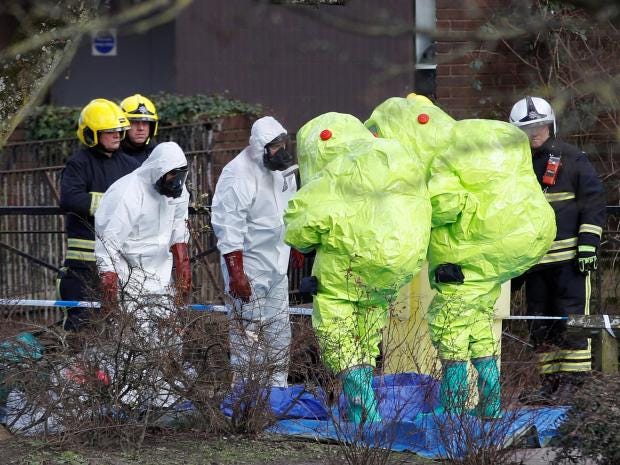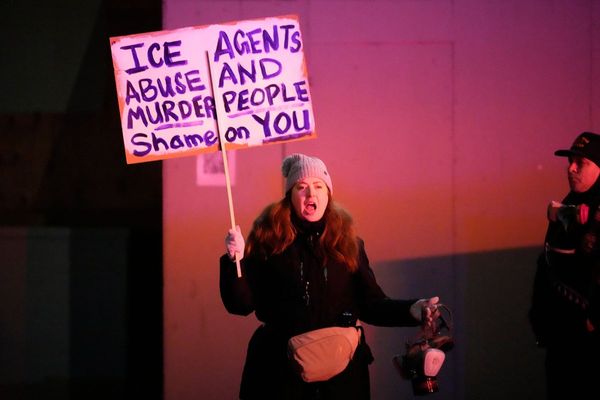
The threat of political assassination is not new to Russia. From Ivan the Terrible’s Oprichniki secret police, dressed in black garbs and the insignia of a severed dog’s head, to the shadow of Stalin’s feared NKVD agents, political opponents to the Moscow regime have long lived their lives in terror.
Today, the methods of control and coercion of opposition are more sophisticated. But the attitude towards those considered traitors remains largely the same.
In a televised discussion shortly after the 2010 spy swap that saw 10 Russian “sleeper” agents traded for four men – including Sergei Skripal, the man now fighting for his life in Salisbury – President Vladimir Putin was blunt. While denying his state engaged in the practice assassination, he asserted a traitor would “come to regret his choice thousands of times over”.
“Someone has betrayed their comrades in arms, people who gave their lives to serving their country,” he said. “How will he be able to live with this? How will he look his kids in the eye? The bastard.”
Mr Skripal, who admitted to passing the names of dozens of active agents to MI6 in exchange for cash, surely has countless enemies within the Russian state and secret services community. On his arrest in 2004, authorities compared him to the infamous Soviet double agent Oleg Penkovsky, who leaked information the location of Soviet missiles in Cuba, and was shot in 1963. Mr Skripal’s 13-year hard-labour prison sentence looks lenient in comparison.
But what is not clear is whether Mr Skripal continued to cooperate with British security services in any meaningful way. Or whether normal inter-agency etiquette accompanying spy swaps has broken down to such an extent that the Kremlin issued an order to assassinate him – a full seven years after being pardoned.
It has become commonplace to link Vladimir Putin’s Kremlin to the mysterious deaths of Russian nationals. Those deaths have ranged from typical mafia-style gunning-down, to excruciating via poison. Usually, the evidence base behind them has been circumstantial. But in the case of Alexander Litvinenko, who died after radioactive poisoning in 2006, a British judge, Sir Robert Owens directly blamed the Kremlin, despite their denials.
Mr Litvinenko’s death was “an FSB operation ... probably approved by [Nikolai] Patrushev [head of the security service in 2006],” he surmised, “and also by President Putin”.
To begin with the facts, President Putin’s time in office has corresponded with the end of many of his critics. In Russia itself, they include opposition politicians like Boris Nemtsov, gunned down in the shadow of the Kremlin in Moscow in 2015, to journalists Yuri Shchekochikhin (2003), Paul Klebnikov (2005), Anna Politkovskaya (2006), Anastasia Baburova (2009), lawyer Stanislav Markelov (2009) and activist Natalya Estemirova (2009) among others.
In 2017, the US publication Buzzfeed went further and linked the Kremlin to a further 14 unexplained deaths on British soil. They included, most prominently, the former spy Alexander Litvinenko (2006), tycoons Boris Berezovsky (2013) and his associate Badri Patarkatsishvili (2008), and the money laundering whistleblower Aleksandr Perepilichny, who dropped dead while jogging in Surrey in 2012.
Kremlin critics have been exposed to a wave of deliberate violence and threats. None of the deaths in Russia have been accompanied by satisfactory investigative work.
But there is also much that distinguishes the cases from one another. Some have deep connections to organised crime. Others involve the occupational hazard of reporting on Chechnya and its explosive leader, Ramzan Kadyrov.
Some of the victims were critics of the regime. Others like Mr Litvnenko, Denis Voronenkov, assassinated in Kiev last year, and Mr Skripal were viewed in Moscow as traitors. The Kremlin has denied ordering their assassinations. Some might argue that is plausible deniability: The Kremlin after all is not the same thing as the larger security services community. Russia’s four main security agencies do operate at the behest of the Kremlin, but the Kremlin is not always in total control of them. There are any number of reports of turf wars, unclear boundaries of responsibilities and out-of-control freelance operations. That turbulence has increased ahead of what many believe is Mr Putin’s final term in office.
But Gennady Gudkov, an opposition politician who worked in the KGB’s counter-espionage section between 1982 and 1993, told The Independent said was unlikely control had broken down to the extent that a “state order” had been issued to kill Mr Skripal.
“I remember what things were like in the KGB, and I have a very negative opinion of Putin, but I can’t believe things have changed so much,” he said. “Had they wanted to kill him, they would have done so while he was in their prison, dying an everyday, unsuspicious death. It’s illogical for them to do it now.”
Instead, the most likely culprits for such a “complicated poisoning” operation were disgruntled elements who lost out over Mr Skripal’s revelations to MI6. “Losing business, or a career – these provoke strong emotions,” he said. “My guess is that it is a group of people, and they could be indirectly connected with government.”
On Tuesday, presidential spokesman Dmitry Peskov said the Kremlin was open to working with the British Government in their investigation. Many will be watching to see if that collaboration is more than that offered in the aftermath of Mr Litvinenko’s death. Then, neither of the two main suspects, Andrei Lugovoi or Dmitry Kovtun, were handed over. Mr Lugovoi subsequently became a deputy in the national parliament.
“The Kremlin needs to be completely committed to this investigation if it is to defend its image,” said Mr Gudkov. “It needs to prove to the world that it is innocent.”







